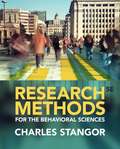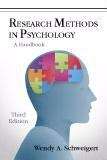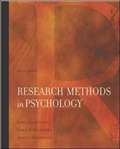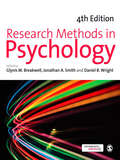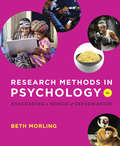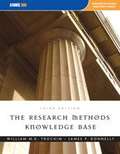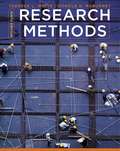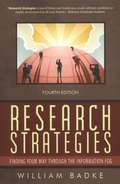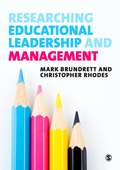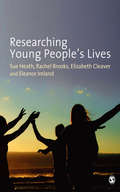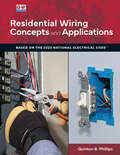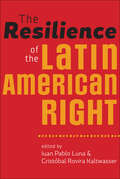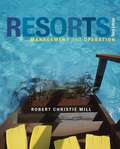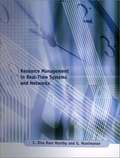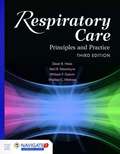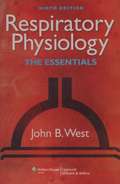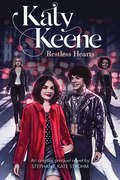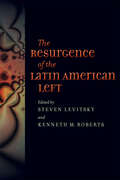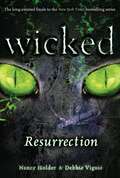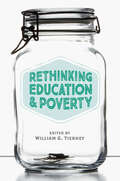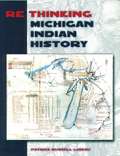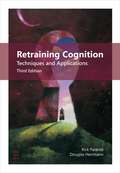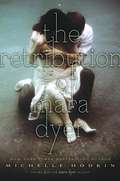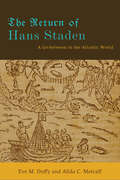- Table View
- List View
Research Methods for the Behavioral Sciences (Fifth Edition)
by Charles StangorThe author provides succinct explanations for a full range of methods, including descriptive, correlational, experimental, and quasi-experimental research designs.
Research Methods in Psychology: A Handbook
by Wendy A. SchweigertThis handbook provides a brief but thorough introduction to the most commonly used research methods in psychology (as well as a number of related topics such as statistics, ethics, and literature searches). The book includes much of the same information presented in longer texts, but in a more succinct format.
Research Methods in Psychology
by Eugene B. Zechmeister John J. Shaughnessy Jeanne S. ZechmeisterConsidered one of the best undergraduate method texts in the field for the past two decades, Research Methods in Psychology captures the excitement of psychological inquiry as well as the importance of understanding the methodology that is used to conduct research. The text has been praised for its clear writing, logical organization, depth of coverage, and wide variety of examples from different fields of psychology. The new edition includes updated research, a thoroughly revised introductory chapter, and improved pedagogical features designed to enhance students' learning.
Research Methods in Psychology (Fourth Edition)
by Jonathan A. Smith Daniel B. Wright Glynis BreakwellResearch Methods in Psychology has been substantially revised in its fourth edition. Continuing to offer enviable coverage of the research methods that psychology students at intermediate levels need to cover in their course, the textbook has now been broadened to cover the full suite of beginner level research methods too. The result is extensive coverage of psychological methods, both quantitative and qualitative, and a textbook that will serve students perfectly from day one in their course at university.<P><P> Research Methods in Psychology in its fourth edition includes: <P> * Extended statistical coverage, including new chapters on Descriptive Statistics, Inferential Statistics, ANOVA, Regression and Correlation, and Latent Variable Models<P> * Further New Chapters on Content Analysis and Writing up your Research<P> * New introductory sections placing each method in context and showing students how they relate to the bigger 'real world' picture. <P> * Intuitive structure and visual layout makes the book easy to navigate so you can quickly find the content you need.<P> This textbook is ideal for beginner and intermediate level psychological research methods students worldwide.<P> Visit the Research Methods in Psychology companion website www.sagepub.co.uk/breakwell4e to take advantage of additional resources for students and lecturers.
Research Methods in Psychology (Second Edition)
by Beth MorlingThis market-leading text emphasizes future consumers of psychological research, uses real-world examples drawn from popular media, and develops students’ critical-thinking skills as they become systematic interrogators of information in their everyday lives
Research Methods Knowledge Base (3rd edition)
by James P. Donnelly William M. K. TrochimThis book provides coverage of quantitative methods and enhanced coverage of qualitative methods. It can be used in a variety of disciplines and is ideal for an introductory comprehensive undergraduate or graduate level course. Through its conversational, informal style it makes material that is often challenging for students both accessible and understandable. The Research Methods Knowledge Base, 3e covers everything from the development of a research question to the writing of a final report.
Research Methods (Ninth Edition)
by Donald H. Mcburney Theresa L. WhiteNow in its 9th Edition, RESEARCH METHODS provides psychology students with a scientific approach to understanding their field of study and the world in general. The text's logical, step-by-step coverage is the result of decades of author experience. It includes all of the stages of the research process, from selecting the project and searching for literature, to choosing a protocol and getting published. RESEARCH METHODS also presents students with problems from selected psychological literature to demonstrate some of the creative ways psychology professionals design and conduct effective research.
Research Strategies: Finding Your Way Through the Information Fog 4th Edition
by William BadkeBecause of the dynamic nature of the Internet, any web addresses or links contained in this book may have changed since publication and may no longer be valid. The views expressed in this work are solely those of the author and do not necessarily reflect the views of the publisher, and the publisher hereby disclaims any responsibility for them.
Researching Educational Leadership and Management: Methods and Approaches
by Mark Brundrett Christopher RhodesCarrying out leadership research in educational establishments can be challenging, but it is also rewarding. This accessible book offers sound practical advice and a clear conceptual framework for this research. Drawing on their extensive expertise, the authors show you how to prepare to carry out research, design research tools, and report and reflect on the results. Students using the book are supported by features such as: key learning objectives in each chapter examples of research tools derived from real leadership project figures explanation of key terms and questions further reading and key web links for each chapter. This text will be of interest to Masters′ and Doctoral level students, academics in the field of educational leadership and management and all those who wish to research a wide range of issues connected with the operation of schools and institutions of further and higher education.
Researching Young People's Lives
by Elizabeth Cleaver Eleanor Ireland Rachel Brooks Sue Heath'Researching young people's lives will be useful to both the novice researcher and anyone interested in learning about new methods of practice' - Youth Studies Australia Researching Young People's Lives provides an overview of some of the key methodological challenges facing youth researchers and an introduction to the broad repertoire of methods used in youth-orientated research. The book is split into two sections. In the first half of the book, the authors consider the broad methodological and contextual concerns of relevance to the design and conduct of youth research, including ethical issues, the importance of context, and the rise of participatory approaches to youth research. The second part of the book focuses on the use of specific research methods in the conduct of youth research, ranging from surveys and secondary analysis through to interviewing, ethnography, visual methods, and the use of the internet in youth research. Throughout the book, the emphasis is on research in practice, and examples are drawn from recent youth research projects from a wide range of disciplines and substantive areas, and from a range of both UK and non-UK contexts. This is an ideal introduction to the field for novice researchers, in particular students studying and researching in the broad area of youth studies. It should also appeal to practitioners engaged in evaluation of service provision to young people, and to established youth researchers who might wish to explore the potential of using a different set of methods to those with which they are already familiar.
Residential Wiring Concepts and Applications
by Quinton B. PhillipsResidential Wiring Concepts and Applications includes a comprehensive, abundantly illustrated, pedagogically strong text, a lab workbook with hands-on activities, and videos, providing a complete solution for introductory courses. Adhering to the 2023 National Electrical Code® (NEC), the textbook introduces entry-level students to fundamental concepts and applications that will be encountered in the workplace. It is divided into two complementary parts: Part I, Basic Knowledge and Skills, covers the necessary knowledge and skills to perform electrical work, providing a firm foundation for students with no prior knowledge; Part II, House Wiring, concentrates on the NEC requirements and practical wiring of a residence in a logical order of operations. With a clear and engaging writing style, the content is organized into digestible chapters to reinforce learning comprehension, followed immediately by real-world applications.
The Resilience of the Latin American Right
by Juan Pablo Luna and Cristóbal Rovira KaltwasserThis comparative study of Latin American conservative politics over the past twenty years analyzes right-of-center actors, electoral movements, parties, and economic policy dynamics.Since the late 1990s, when Latin American countries began making a "turn to the left," political parties and candidates on the right end of the partisan spectrum have had a difficult time achieving electoral success. Although the left turn can be seen as a natural reaction to the public’s general dissatisfaction with the conservative modernization policies of the 1980s and 1990s, left-of-center politics are by no means permanent. In The Resilience of the Latin American Right, Juan Pablo Luna and Cristóbal Rovira Kaltwasser seek to "right" this view by explaining the strategies conservative political parties have used to maintain a foothold in the region’s electoral and governance processes. The editors provide an analytical framework for conceptualizing the right that works for both historic and contemporary politics, and the volume’s contributors use the framework to evaluate right-of-center political activity across the continent. They find that conservative forces are pursuing a range of adaptive strategies, including nonelectroral and nonpartisan tactics. The book’s four thematic sections include an analysis of parties and elections in Argentina, Bolivia, Brazil, Chile, Colombia, Ecuador, El Salvador, Mexico, Peru, and Venezuela.Students and scholars of both Latin American politics and comparative politics will find The Resilience of the Latin American Right of vital interest.
Resorts: Management and Operation (Third Edition)
by Robert Christie MillThe 3rd Edition of Resorts: Management and Operation is a summary of almost 30 years of thought, analysis, and research into the field of resort management written from a business viewpoint yet takes into account the unique structure of resorts. The text is divided into three sections. Each section has a philosophical basis for the inclusion of the subsequent principles and practices. The first section covers major types of resorts: those that are mountain-based, beach-based and golf/tennis based. Two chapters are devoted to each of the various resort types. The first chapters of each resort type focuses on development issues with the impact on operations noted throughout. The second chapter in each resort type deals with guest profiles and management issues. The second section highlights what makes managing a resort different from managing a 'regular' hotel. The final section features a newly expanded chapter on spas, pools, and indoor water parks along with individual chapters on specialty resorts, cruise ships and casinos, reflecting the importance of these types of properties.
Resource Management in Real-Time Systems and Networks
by C. Siva Ram Murthy G. ManimaranReal-time systems and networks are of increasing importance in many applications, including automated factories, telecommunication systems, defense systems, and space systems. This book introduces the concepts and state-of-the-art research developments of resource management in real-time systems and networks. Unlike other texts in the field, it covers the entire spectrum of issues in resource management, including task scheduling in uniprocessor real-time systems; task scheduling, fault-tolerant task scheduling, and resource reclaiming in multiprocessor real-time systems; conventional task scheduling and object-based task scheduling in distributed real-time systems; message scheduling; QoS routing; dependable communication; multicast communication; and medium access protocols in real-time networks. It provides algorithmic treatments for all of the issues addressed, highlighting the intuition behind each algorithm and giving examples. The book also includes two chapters of case studies.
Respiratory Care: Principles And Practice
by Dean R. Hess Neil R. Macintyre William F. Galvin Shelley C. MishoeWith contributions from over 75 of the foremost experts in the field, the third edition of best-selling Respiratory Care: Principles and Practice represents the very best in clinical and academic expertise. Taught in leading respiratory care programs, it continues to be the top choice for instructors and students alike. The Third Edition includes numerous updates and revisions that provide the best foundational knowledge available as well as new, helpful instructor resources and student learning tools. Respiratory Care: Principles and Practice, Third Edition is a complete and up-to-date exploration of the technical and professional aspects of respiratory care. With foundations in evidence-based practice, this essential resource reviews respiratory assessment, respiratory therapeutics, respiratory diseases, basic sciences and their application to respiratory care, the respiratory care profession, and much more. Respiratory Care: Principles and Practice, Third Edition incorporates the latest information on the practice of respiratory care into a well-organized, cohesive, reader-friendly guide to help students learn to develop care plans, critical thinking skills, strong communication and patient education skills, and the clinical leadership skills needed to succeed.
Respiratory Physiology: The Essentials 9th Edition
by John B. WestWidely considered the gold standard for the teaching and learning of respiratory physiology, this fully updated Ninth Edition includes key points for each chapter and multiple-choice review questions and answers with full explanations.
Responding to Literature: American Literature
by Arthur N. Applebee Judith A. Langer Julie West JohnsonAmerican Literature textbook
Restless Hearts (Katy Keene, Novel #1)
by Stephanie Kate StrohmAn original prequel novel based on the hit CW show Katy Keene!Before Katy, Jorge, Pepper, and Josie were best friends, they were just four teenagers following their dreams. Katy Keene is struggling to get by after her mom's death. That is, until she gets a call from her old friend Veronica Lodge with the opportunity of a lifetime. Uptown, Jorge Lopez is trying to break into Broadway. There's an open call coming up that could make his dreams a reality-but landing the role might mean pretending he's someone else.According to the tabloids, Pepper Smith is one of the most notorious socialites in the city. Good thing they don't know the truth about her past.And Josie McCoy left Riverdale to tour the country and pursue her dreams. But if she wants to become a star, it might be time for a change. . .Told from alternating points of view, this Katy Keene prequel novel is an original story not seen on the show!
The Resurgence of the Latin American Left
by Steven Levitsky Kenneth M. RobertsLatin America experienced an unprecedented wave of left-leaning governments between 1998 and 2010. This volume examines the causes of this leftward turn and the consequences it carries for the region in the twenty-first century.The Resurgence of the Latin American Left asks three central questions: Why have left-wing parties and candidates flourished in Latin America? How have these leftist parties governed, particularly in terms of social and economic policy? What effects has the rise of the Left had on democracy and development in the region? The book addresses these questions through two sections. The first looks at several major themes regarding the contemporary Latin American Left, including whether Latin American public opinion actually shifted leftward in the 2000s, why the Left won in some countries but not in others, and how the left turn has affected market economies, social welfare, popular participation in politics, and citizenship rights. The second section examines social and economic policy and regime trajectories in eight cases: those of leftist governments in Argentina, Bolivia, Brazil, Chile, Ecuador, Uruguay, and Venezuela, as well as that of a historically populist party that governed on the right in Peru. Featuring a new typology of Left parties in Latin America, an original framework for identifying and categorizing variation among these governments, and contributions from prominent and influential scholars of Latin American politics, this historical-institutional approach to understanding the region’s left turn—and variation within it—is the most comprehensive explanation to date on the topic.
Resurrection (Wicked #5)
by Nancy Holder Debbie ViguiéWho is Alex Carruthers? That is the question Wicked fans have been asking for nearly six years. Spellbound, the fourth and seemingly final book in the Wicked series, originally published in 2003, left readers on the edge of their seats with a classic cliffhanger ending. But now, as new fans of the bind-up editions of the series begin to ask the same question, the true and final conclusion to the Wicked series will emerge. And all their questions will be answered in this heart-stopping, magical adventure about witches, destiny, and the beyond.
Rethinking Education and Poverty: Edited By William G. Tierney
by William G. TierneyHow can new ways of thinking about education improve the lives of poor students?In Rethinking Education and Poverty, William G. Tierney brings together scholars from around the world to examine the complex relationship between poverty and education in the twenty-first century. International in scope, this book assembles the best contemporary thinking about how education can mediate class and improve the lives of marginalized individuals.In remarkably nuanced ways, this volume examines education's role as both a possible factor in perpetuating—and a tool for alleviating—entrenched poverty. Education has long been seen as a way out of poverty. Some critics, however, argue that educational systems mask inequality and perpetuate cycles of poverty and wealth; others believe that the innate resilience or intellectual ability of impoverished students is what allows those individuals to succeed. Rethinking Education and Poverty grapples in turn with the ramifications of each possibility.Throughout these compelling, far-reaching, and provocative essays, the contributors seek to better understand how local efforts to reduce poverty through education interact—or fail to interact—with international assessment efforts. They take a broad historical view, examining social, economic, and educational polices from the postWorld War II period to the end of the Cold War and beyond. Although there is no simple solution to inequality, this book makes clear that education offers numerous exciting possibilities for progress.
Rethinking Michigan Indian History
by Patrick Russell LebeauRethinking Michigan Indian History is a teaching tool that honors the Chippewa, Ottawa, and Potawatomi and the twelve federally recognized tribes of Michigan by recognizing their role and place in Michigan history-- exploring what most people know (or do not know) about them. Each lesson includes a background narrative, a set of hands-on, tactile activities, and provides easily understood and visual resources. Rethinking Michigan Indian History explores large issues of Indian stereotypes, the narrow focus on "great" Indian men, the lack of knowledge about treaties and treaty rights, and the role of maps to mislead or distort thinking about how history unfolds and the complexities of land ownership. The lesson exploring Indian stereotypes identifies their existence not only in U.S. consumer culture but also in K-12 classrooms. The goal, however, is not to rebuke the consumer for having bought Big Chief Sugar or the teacher for having young students construct one-dimensional canoes, paddles and Indians out of paper and glue but to use those activities as a demonstration of what most people know about Indians. From this point, a foundation of facts can begin to replace stereotypes in the learning process. Demonstrating further how popular influences can control knowledge, the lesson on "great" Indian men shows how the popular preference for biographies of famous Indian warriors, like Pontiac and Tecumseh or individual women, like Pocahontas and Sacagawea, narrows an understanding of Indians to symbolic representations and issues and ignores their ongoing culture. The lesson on Indian treaties and maps explains and visually shows the reason the Chippewa, Ottawa, and Potawatomi lived in Michigan in 1760 and live in Michigan today in roughly the same places. Treaties are explored in a manner understandable to fourth graders through adults.
Retraining Cognition: Techniques and Applications (Third Edition)
by Rick Parenté Douglas J. HerrmannTextbook on cognitive rehabilitation therapy, for psychology and rehabilitation students. Discusses therapeutic methods and their theoretical foundations in cognitive psychology, neuropsychology, and speech.
The Retribution of Mara Dyer: The Unbecoming Of Mara Dyer; The Evolution Of Mara Dyer; The Retribution Of Mara Dyer (The Mara Dyer Trilogy #3)
by Michelle HodkinIt had to end sometime, but Mara had no idea it would end like this. Experience the mind-blowing conclusion to the New York Times bestselling Mara Dyer trilogy.Mara Dyer wants to believe there's more to the lies she’s been told. There is. She doesn’t stop to think about where her quest for the truth might lead. She should. She never had to imagine how far she would go for vengeance. She will now. Loyalties are betrayed, guilt and innocence tangle, and fate and chance collide in this shocking conclusion to Mara Dyer’s story. Retribution has arrived.
The Return of Hans Staden: A Go-between in the Atlantic World
by Eve M. Duffy Alida C. MetcalfHans Staden’s sixteenth-century account of shipwreck and captivity by the Tupinambá Indians of Brazil was an early modern bestseller. This retelling of the German sailor’s eyewitness account known as the True History shows both why it was so popular at the time and why it remains an important tool for understanding the opening of the Atlantic world. Eve M. Duffy and Alida C. Metcalf carefully reconstruct Staden’s life as a German soldier, his two expeditions to the Americas, and his subsequent shipwreck, captivity, brush with cannibalism, escape, and return. The authors explore how these events and experiences were recreated in the text and images of the True History. Focusing on Staden’s multiple roles as a go-between, Duffy and Metcalf address many of the issues that emerge when cultures come into contact and conflict. An artful and accessible interpretation, The Return of Hans Staden takes a text best known for its sensational tale of cannibalism and shows how it can be reinterpreted as a window into the precariousness of lives on both sides of early modern encounters, when such issues as truth and lying, violence, religious belief, and cultural difference were key to the formation of the Atlantic world.
